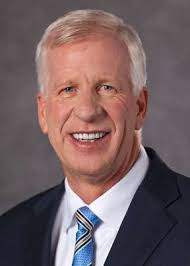
While environmentalists are critical of the recent leasing of federal land in Oklahoma and New Mexico by the U.S. Bureau of Land Management, one Oklahoma energy leader believes there are many obstacles before any fracking moratorium is enacted on federal land. And he says any drilling moratorium will hurt the nation’s economy.
The belief comes from David A. Hager, President and CEO of Devon Energy in Oklahoma City. He spoke about the issue in a recent conference call following the company’s third quarter earnings release.
“And the final item I would like to address is the recent political rhetoric regarding drilling and fracking moratoriums on federal land. Although we believe substantial obstacles exist for such an idea to be enacted into law, I do want to highlight that only 20% of our total company wide leasehold resides on federal land.”
Devon’s largest federal acreage holding is in the Powder River Basin of Wyoming which accounts for about 60 percent of the company’s leasehold in the operating area. About half of Devon’s holdings in the Delaware basin are federal leases. The company’s holdings in the STACK in Oklahoma and the Eagle Ford in South Texas are entirely on priivate lands.
“Regardless of how the politics of this issue will ultimately be resolved, I do want to emphasize that we have been building a deep inventory of federal drilling permits in our highest confidence development areas within the Delaware and Powder River Basin. Furthermore, our diversified, multibasin portfolio provides the flexibility and the depth of inventory within each of our core basins to be nimble and quickly pivot drilling activity to private leasehold that is highly-economic and well positioned on the cost curve,” said Hager.
He told investors and analysts the diversified portfolio positions the company well to adapt to a scenario attempting by those opposed to drilling on public lands.
“We fundamentally believe that the basic notion of such campaign rhetoric is fraught with serious economic ramifications. This proposal would unfairly harm the communities that financially benefit from our business activity, as well as impact the broader U.S. economy from an inevitable spike in energy costs
that would unnecessarily limit GDP growth,” added Hager.
The recent sale of federal leases in Oklahoma and New Mexico was on Nov. 7 and produced $18.4 million in revenue with nearly half of it returned to the two states where the oil and gas is produced.
The sale involved 16 parcels totaling 7,619 acres, most of it in New Mexico’s Permian Basin. Reports indicated the highest bid per acre was $18,501 in Lea County with Federal Abstract Company being the winning bidder.
The highest price paid for any one parcel was $15.3 million. Chevron purchased the lease to 1,534 acres in New Mexico’s Eddy County. The leases will last for 10 years.
“The BLM’s policy is to promote oil and gas development if it meets the guidelines and regulations set forth by the National Environmental Policy Act of 1969 and other subsequent laws and policies passed by the U.S. Congress,” read a BLM statement.
“The sales are also in keeping with the America First Energy Plan, which is an all-of-the-above plan that includes oil and gas, coal, strategic minerals, and renewable sources such as wind, geothermal, and solar, all of which can be developed on public lands.”





